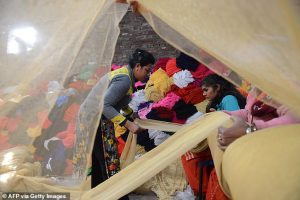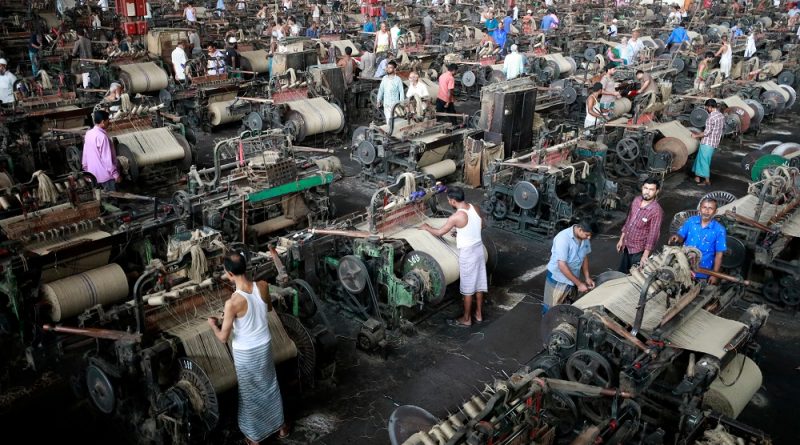Major Market Brands Involved In The Exploitation Of Indian Workers
Vivian Haas
International Business Writer
Allegations of exploitative condition and poor working conditions have come out against major brand factories in India. There are allegations against the supermarket chains Marks & Spencer, Tesco, and Sainsbury’s, in addition to the fashion company Ralph Lauren, from factory workers who claim that they are being exposed to poor working conditions that include overworking without compensation, no bathroom and water breaks, and a threatening environment.
In an interview with BBC, a female Ralph Lauren employee (who wishes to remain anonymous) claimed in an interview that, “We’re made to work continuously, often through the night, sleeping at 3am then waking up by 5am for another full day”. Claims against Ralph Lauren center around managers forcing workers to stay overnight without prior notice to complete orders, sometimes making them sleep on the factory floor. The workers had to stay absurd hours to create clothing to keep up with the high demand set by the employer company. If the workers, who are primarily women, refused to work these additional hours, they were threatened to be fired. In addition, the workers claim to be constantly subjected to verbal abuse from their supervisors. Not only are these female workers subjugated to horrible working conditions, but they are also living in fear while working at these factories.
These claims of overworking go against India’s Factories Act, which states that “no worker should exceed more than 48 hours a week and work a max of 9 hours a day”. The law also states that female workers should only work night shifts if they choose to do so, which Ralph Lauren is violating by forcing female workers to stay overnight to make the brand’s clothing. When Ralph Lauren heard about these claims, the company stated that they were deeply concerned because they are a part of the Ethical Trading Initiative (ETI). The ETI includes a pledge that workers are not subjected to verbal abuse, overtime is voluntary, and working hours are not excessive. Since the allegations against Ralph Lauren claiming their factories violated the pledge they took, Ralph Lauren has stated that they will conduct investigations in order to ensure a safe, healthy, and ethical workplace.

Allegations against the supermarket chain Marks & Spencer include no bathroom breaks, not being able to drink water while on shift, and barely getting time to eat lunch. One worker revealed that her manager would stand behind staff in the canteen and blow a whistle to send them back to work. There have also been claims of increased workloads, being forced to stay late, and if the workers refuse to work overtime, then they are threatened to be fired. Marks & Spencer claimed they were shocked about these allegations and conducted an unannounced audit of its Indian sites. As a result, Marks & Spencer found evidence of unacceptable overtime working practices. To protect their employees and make sure that there is no misuse of overtime, the company will implement regular unannounced audits to check their working practices. However, Marks & Spencer did not find any evidence regarding bathroom breaks, workers being denied water, or verbal abuse. Since the company did not find any evidence regarding these allegations, the company has disputed these claims made by the employees.
Tesco and Sainsbury have also received the same allegations as Marks & Spencer Workers from both companies have claimed that they do not receive bathroom breaks, they work overtime without extra pay, not being able to drink water while on shift, and barely get time to eat. In response to these allegations, Tesco revealed their plans to prohibit workers from receiving excessive overtime and ensure that their employees are fully compensated at the correct rates for any overtime hours they worked. Sainsbury claims that they will closely monitor their factories to watch for any unethical practices that may occur. Sainsbury is also insisting on a number of actions with the supplier in order for them to continue working with the factory. Sainsbury hopes that the supplier will take actions against the factories that overexploited their employees and put in rules and regulations to protect the employees.
All brands that were related to this scandal do not own or operate the factories that have these harsh work environments. The factories are suppliers and manufacturers of products for these companies around the world. While there is a distance between the brand companies and the factories, the brands are being admonished for using factories that put these unethical work practices into place One owner of the clothing supplier stated that with brands pushing for cheaper clothes, suppliers are forced to cut corners to meet orders, which can result in the mistreatment of employees. These employees are constantly subjected to harsh working conditions and exploitation, despite the companies attempts at auditing. The factories usually know when these audits are coming and temporarily fix everything beforehand. As a result, eliminating exploitation becomes very hard to identify in the supplier business, especially when it involves female workers. When businesses look to cut costs for the sake of profits, female workers usually find themselves being taken advantage of. BBC has shown women working in garment factories earning as little as $2.96 a day. The responsibility of eradicating exploitation cannot fall solely on the employer brand companies. The Indian government must take actions as well in order to stop the mistreatment of employees.
Contact Vivian at haasvivi@shu.edu

